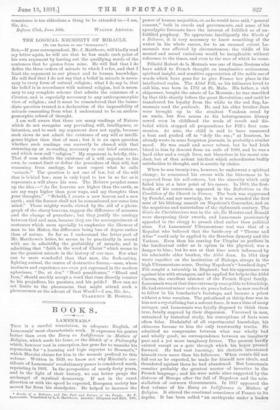THE LOGICAL NECESSITY OF MIRACLE. [To THE EDITOR or THE
" $PECTAT011.1
SIR,—If your correspondent, Mr. J. Matthews, will kindly read my letter again, he will see that he has made each point of his own argument by leaving out the qualifying words of the sentences that he quotes from mine. He will find that I do define the three orders of miracle to which I refer, and that I limit the argument to our planet and to human knowledge. He will find that I do not say that a belief in miracle is neces- sary to every form of natural religion ; what I do say is, that the belief is in accordance with natural religion, but is neces- sary to any complete scheme that admits the existence of a -Creator, and is especially necessary to any anthropomorphic view of religion ; and it must be remembered that the imme- diate question treated is a declaration of the impossibility of miracle emanating from what I understand to be an anthro- pomorphic school of thought.
I am well aware that there are many readings of Nature
which do not recognise any pervading will, intelligence, or intention, and to such my argument does not apply, because such views do not admit the existence of any will or intelli- gence higher than that of man ; but it is an open question whether such readings can correctly be classed with that summing-up or re-reading necessary to our brief existence, and which men call "religion." My argument is, briefly, this : That if man admits the existence of a will superior to his ,own, he cannot limit or define the procedure of that will, but reasoning from analogy, he must expect what he calls
'miracle." The question is not one of law, but of the will that is behind law ; man is only loyal to law in so far as it represents a will above his own. The Hebrew prophet sums up the idea :—" As the heavens are higher than the earth, so are my ways higher than your ways, and my thoughts than your thoughts." " Behold, I create a new heaven and a new .earth; and the former shall not be remembered nor come into mind." These mighty words, viewed by the aid of a photo- graph of the starry heavens, suggest the difference of measure and the change of procedure ; but they justify the analogy between God and man, because they are the accompaniment of sentences which seem specially to emphasise the likeness of man to his Maker, the difference being 'one of degree rather than of nature. So far as I understand the latter part of Matthews's letter, he seems to be practically in accord with me in admittihg the probability of miracle, and in .admitting that "faith in the word of Christ" which seems to
Me the greatest miracle in the history of our race. For what can be more wonderful than that man, the flesh-eating, fighting animal, the centre of destructive forces,—man, whose instincts and experience are even yet expressed in the modern aphorisms, "Do, ut des," "Bead possidentes," "Blood and
Iron," should meekly accept a word that runs directly counter to his prejudices, his passions, and his pride ? How can we -set limits to the phenomena that might attend such a phenomenon as the advent of that Word P—I am, Sir, &c., CLARENCE M. DOBELL.


































 Previous page
Previous page